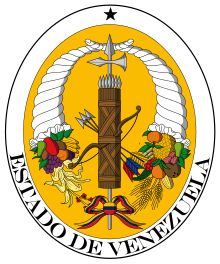| Political Constitution of the State of Venezuela | |
|---|---|
 Provisional coat of arms of Venezuela (1830-1836). | |
| Ratified | September 22, 1830 |
| Date effective | September 24, 1830 |
| Repealed | April 16, 1857 |
| Author(s) | Members of the Congreso de Valencia |
| Signatories | 48 Members of Parliament |
| Subject | Independence of Venezuela from Gran Colombia.[1] |
| Purpose | To establish a federal center state under a republican, popular, representative, responsible and alternative system of government.[2] |
The Constitution of Venezuela of 1830 (official name: Constitution of the State of Venezuela. Spanish: Constitución del Estado de Venezuela) was the fourth Magna Carta in force in Venezuela from 1830 to 1857, being the second most valid Venezuelan fundamental law.[3] Approved by the Constituent Congress of Valencia, on September 22, 1830 and promulgated by General José Antonio Páez two days later. The Constituent Congress of 1830 that sanctioned it had begun its sessions in the city of Valencia on May 6, 1830, with the attendance of 33 deputies of the 48 that had been elected in representation of the provinces of Cumaná, Barcelona, Margarita, Caracas, Carabobo, Coro, Mérida, Barinas, Apure, Barquisimeto, Guayana and Maracaibo. In March 1857 this text was repealed when the Constitution of 1857 was approved and promulgated.
The end of the validity of the constitutional text of 1830 marked the beginning of a period through which many constitutional texts would be promulgated with the sole intention of perpetuating the Venezuelan caudillo in the presidency of the Republic. The Revolution of the Reforms of 1836, the social revolts promoted by Antonio Leocadio Guzmán in 1842, the sectarianism of the Conservative Party, the assault on the National Congress in 1848, the first government of José Tadeo Monagas and the subsequent election of his brother José Gregorio Monagas, represent the political context of post-independence Venezuela. The Congress of Valencia designed the national organization by means of the three classic public powers, namely: Legislative, Executive and Judicial.
- ^ "Reseña del Ministerio de Comunicación e Información del Gobierno venezolano sobre la Constitución de 1830" (in Spanish). Archived from the original on November 13, 2017. Retrieved November 13, 2017.
- ^ "Constitución de 1830, Artículo 6" (PDF) (in Spanish). Archived from the original (PDF) on November 14, 2017. Retrieved November 13, 2017.
- ^ "Artículo de Rafael Caldera sobre las Constituciones venezolanas hasta la recién promulgada Constitución de 1961" (PDF) (in Spanish). Archived from the original (PDF) on November 13, 2017. Retrieved November 13, 2017.